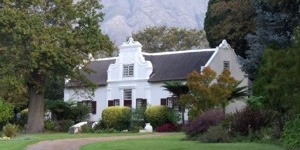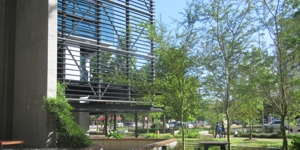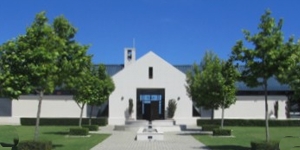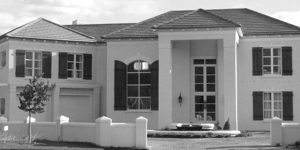Day 1. HISTORICAL WATERFRONT
MOUILLE POINT LIGHTHOUSE

MOUILLE POINT LIGHTHOUSE
Put up in 1824 Built in 1888, this famous historical structure is still in use today; it was the first lighthouse in South Africa. It is in close proximity to the Cape Town Stadium in Mouille Point and just a short distance from the V & A riverside. Great pictures can be taken because to the bright red and white chevron pattern. Green Point Park borders the lighthouse. (Click on the link ARCHITECTCAPETOWN for more weekend activities.
Also see ARCHITECTCAPETOWN for best playparks for kids in Cape Town).
DRY DOCK
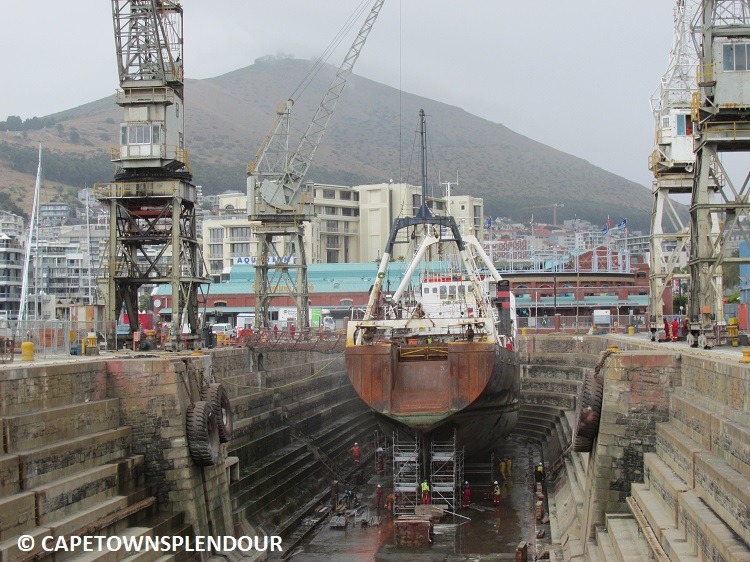
ROBINSON DRY DOCK
For the purpose of servicing huge ships, this maritime parking area is devoid of water. Governor Sir Hercules Robinson formally opened the dry dock in 1882; its official name is the Robinson Graving Dock. It is one of the few remaining dry docks where the dock's shape mimics that of the ship.
CLOCK TOWER
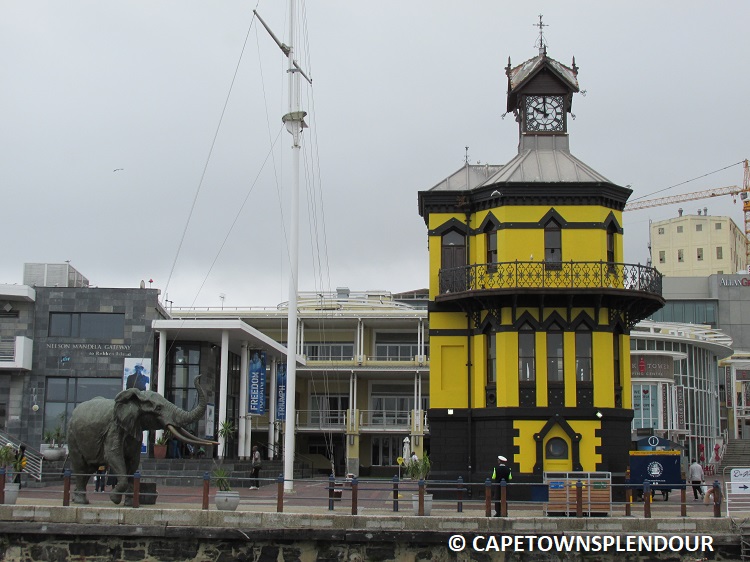
THE CLOCK TOWER
Constructed in 1883, it served as the inaugural office of the Port Captain, whose responsibilities encompassed measuring the tide via a shaft linked to the sea. The data regarding sea levels was communicated to transiting vessels. It also contains a clock, signal flags, Morse lamps, and a telescope. Initially coated in white, it is now adorned in red. In 2014, Cape Town was painted yellow for one year to commemorate its designation as a World Design Capital.
PORT CAPTAIN’S OFFICE

PORT CAPTAIN'S OFFICE
As the harbor expanded, the clock tower became insufficient to accommodate the Port Captain. The blue and white gabled structure, erected in 1904, embodies a Cape Dutch architectural style infused with a maritime essence, significantly enriching the harbor's ambiance.
YOU MIGHT ALSO LIKE:
Visit GLOSSY-MAGAZINE for more most exciting places to take toddlers in Cape Town. Click on the link GLOSSY-MAGAZINE to find out about the best places to go sightseeing when you are in the Cape Winelands. Visit the link GLITZYMAGAZINE for more things for the whole family to do on weekends in Cape Town.
EXTRA DAY: ROBBEN ISLAND LIGHTHOUSE

ROBBEN ISLAND LIGHTHOUSE
Image taken by Prasad Pillai, CC BY 2.0 and sourced from WIKIMEDIA COMMONS.
The sole lighthouse in South Africa that emits a flash without rotation is the Robben Island lighthouse. It was completed in January 1865. Electricity was introduced in 1938, and the lighthouse reaches a height of 18 meters. The light is seen from a distance of 25 kilometers.
Mintoheuwel, the island's highest elevation, is the location of the site. Before the construction of the lighthouse, flames were ignited on the hill to signal seafarers on the island's location. During that period, the hill was also known as Vuurberg.
The lighthouse is generally not included in the planned itineraries.
The Gateway to Robben Island is situated on the riverbank of the V&A. To circumvent waiting in line, ensure you have completed your reservation online at www.robben-island.org.za. You can traverse the island by boarding a ferry from this spot, disembarking at Murray Harbour. The tour's duration, inclusive of travel time, is around three and a half hours.
Buses manned by informed tour guides convey guests to numerous notable sites across the island from that location. The places encompass the army and navy bunkers, the lime quarry where Nelson Mandela was employed, Robert Sobukwe's residence, the Bluestone Quarry, and notably, the high-security prison where Nelson Mandela was incarcerated, including his jail cell.
HOME ARCHITECTS OF SOMERSET WEST>
NOBEL SQUARE
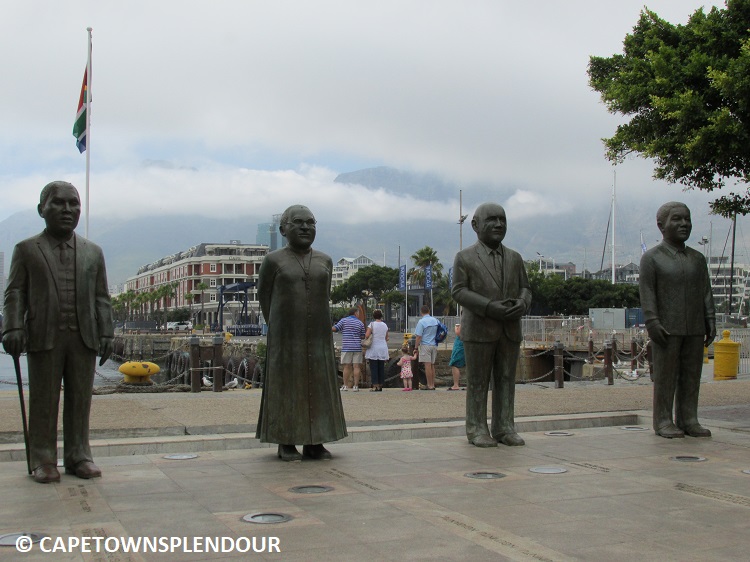
NOBEL SQUARE
Nobel Square is a public plaza located in the Victoria & Alfred Waterfront district of Cape Town, South Africa. Opened in December 2005, it features statues dedicated to Nelson Mandela, Albert Lutuli, Desmond Tutu, and F. W. de Klerk, the nation's four Nobel Peace Prize laureates. Former Western Cape Premier Marthinus van Schalkwyk and current Premier Ebrahim Rasool, who held office from 2004 to 2008, conceived the idea for the square.
After discussions with Lutuli's family and current Prize recipients, who were present for the unveiling with Lutuli's daughter and the Norwegian ambassador to South Africa, the initiative was formally launched with the backing of the Western Cape government. The sculptures, positioned in a semicircle away from Table Mountain, are marginally elevated above the four individuals they represent. The phrases of each figure are engraved on the ground before it.
ALSO GO TO:
Go to GLOSSY-MAGAZINE for an itinerary for travel to Franschhoek that focuses on family friendly venues. Visit RAINBOWLEARNER for an exciting new range of learning materials for early-learning.
DAY 2. CAPE POINT
OLD LIGHTHOUSE
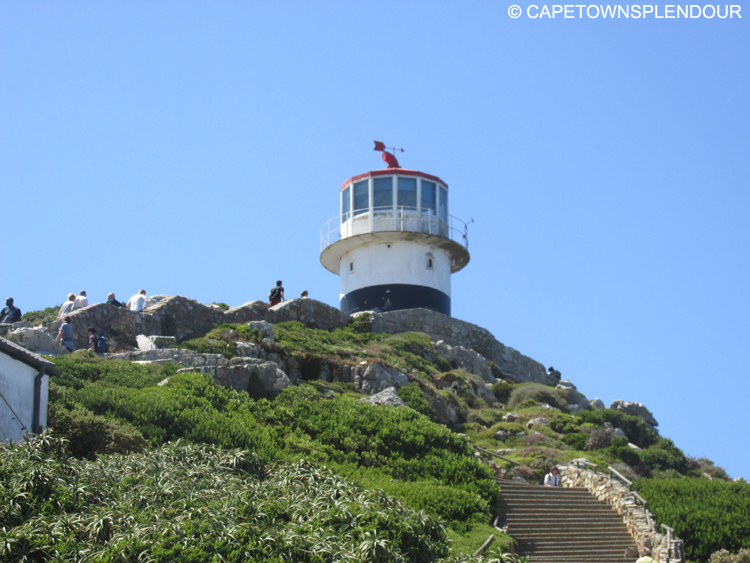
THE OLD LIGHTHOUSE AT CAPE POINT
The initial lighthouse was constructed atop Cape Point Peak in 1860. Situated 262 meters above sea level, this location had several deficiencies that resulted in shipwrecks. In 1919, a new lighthouse was constructed nearer to the tip of the Peninsula to address this issue. Currently, both lighthouses serve as significant tourist attractions; however, only the one constructed in 1919 remains operational. The first lighthouse emitted a flash every 12 seconds and possessed a range of 32 nautical miles.
Find also...
ARCHITECTCAPETOWN with more on 3-day historical
itinerary of Franschhoek town.
Press on the link
ARCHITECTCAPETOWNfor more about toddler activities and sightseeing with the whole family.
NEW LIGHTHOUSE
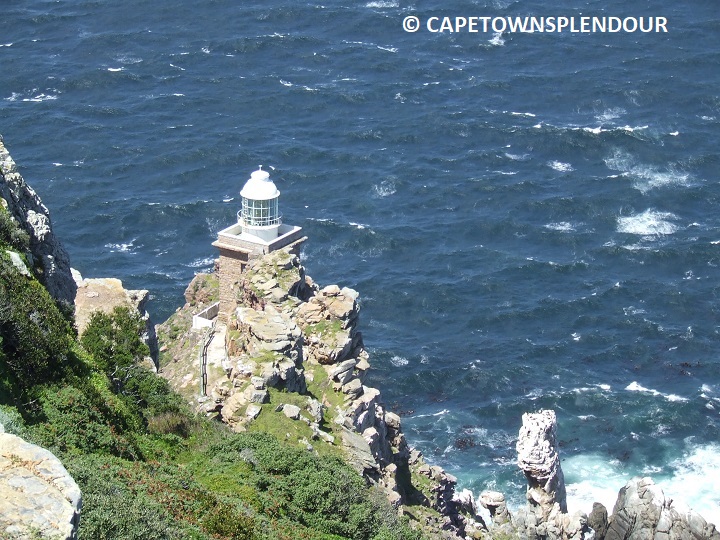
THE NEW LIGHTHOUSE AT CAPE POINT
The Harold Cooper lighthouse was constructed in 1919 to supplant the previous structure at Cape Point Peak. It has an exquisite white lantern house elevated on a tall brick pedestal. It is constructed 87 meters above sea level on Diaz Point, far nearer to the shoreline than its predecessor. The light illuminates three times every thirty seconds. It possesses a 63 nautical-mile radius, rendering it visible at double the distance of the previous lighthouse. It is the most luminous beacon on the South African coastline, with a brightness of 10 million candelas.
More information at
ARCHITECTCAPETOWN on the Cape Dutch houses of Franschhoek.
VISIT THESE RELATED SITES:
Visit GLOSSY-MAGAZINE for plenty stunning tourist attractions in the Winelands region of South Africa.
Go to
GLITZYMAGAZINE to find out about Cape Dutch houses and gardens - a style endemic to South Africa.
You might also enjoy GLITZYMAGAZINE to discover more natural and built attractions in the Cape Winelands.
BACK TO THE ARCHITECTURE HOMEPAGE>
DIAS CROSS
This monument was erected to commemorate the arrival of the Portuguese navigator Bartholomew Dias to the cape in 1488. He was the inaugural European navigator to circumnavigate the southern extremity of Africa. The tower serves as a navigational positioning beacon. The sides are painted black to enhance contrast with the skyline.
The original cross raised by the explorer was constructed of wood, and the Portuguese term for it was "Padros." It is no longer in existence, and has been replaced by the concrete monument.

THE ORIGINAL CROSS OF DIAS
Iziko William Fehr Collection (Castle of Good Hope), Public domain, via Wikimedia Commons
A stunning artwork depicting this event was produced by F. Benda in the 18th century. The oil painting is housed in the Iziko William Fehr Collection at the Castle of Good Hope.
This work is in the public domain in its country of origin and in other jurisdictions where the copyright duration is the author's life plus 100 years or less.
DA GAMA’S CROSS
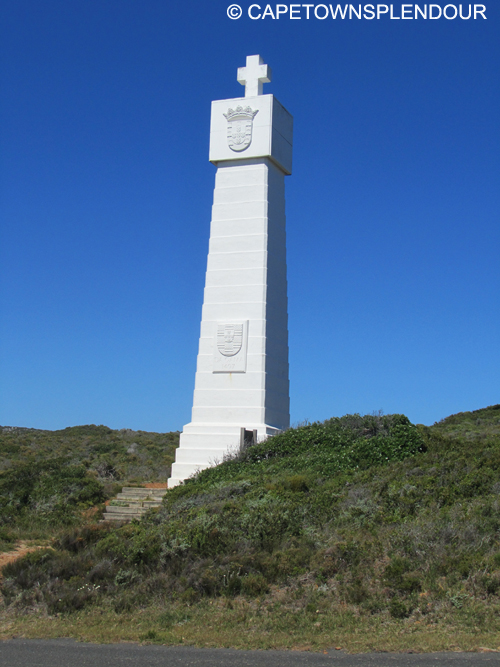
DA GAMA'S CROSS - MONUMENT
Analogous to the Diaz cross, another monument was established by the Portuguese government to commemorate Vasco Da Gama's expedition to the Cape in 1497. Aligned with the Diaz cross, the two crosses direct vessels towards the Whittle Rock shipping yard in False Bay. The Da Gama monument features a shield embossed on its upper part. The two voyages of the Portuguese navigators significantly predated the entrance of the Dutch inhabitants in the region, as well as its designation as a refreshment station for expeditions to the East. Da Gama was the inaugural navigator to traverse the path from Europe to the East. His expedition occurred from 1497 to 1499, spanning two years in total.
On 20 May 1498, following decades of maritime endeavors to access the Indies, which resulted in the loss of thousands of lives and numerous ships due to shipwrecks and assaults, da Gama arrived in Kozhikode. The Portuguese Empire's economy, once reliant on North and coastal West Africa, benefited from unimpeded access to the Indian spice trade. Initially, the primary spices imported from Southeast Asia were pepper and cinnamon; nevertheless, they were soon accompanied by other commodities, all of which were unfamiliar to Europe. Portugal had a market monopoly on some goods for several decades. It was not until a century later that other European powers could challenge Portugal's monopoly and naval supremacy on the Cape Route.
PRESS ON THE LINKS FOR MORE:
Click on the link GLITZYMAGAZINE for a list of exciting activities for toddlers and older children.
Also visit GLITZYMAGAZINE for stunning photographs of parks, gardens and hiking trails in and around Cape Town.
You might also like GLOSSY-MAGAZINE which focuses on built landmarks that tourists visit when the come to Cape Town.
SIMONSTOWN NAVAL BASE
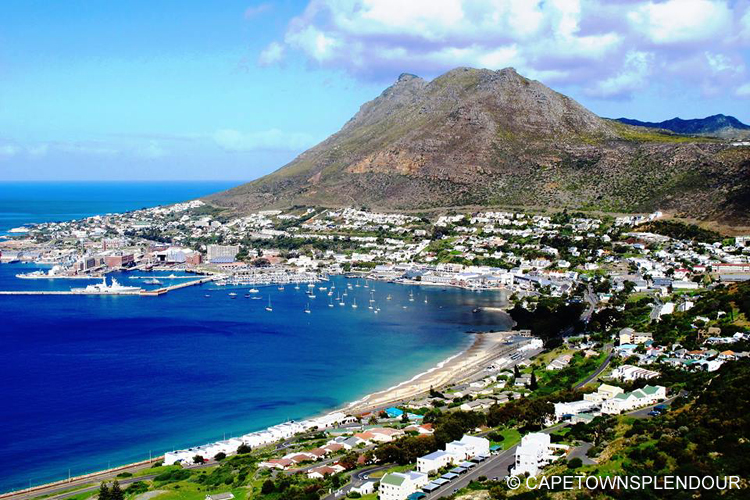
Simonstown Naval Base
The principal naval facility of the South African Navy is situated in the City of Cape Town Metropolitan Municipality, Western Cape, at Naval facility Simonstown. Fleet Command depends on the base for operational support.
In 1743, the Dutch East India Company established a small dockyard in Simon's Town. In the 1790s, the British Royal Navy (RN) took command of the station, subsequently expanding and modernizing it for the next 150 years. In the 1740s, the Dutch East India Company erected two appealing stone warehouses along the river, commemorating the ancient location of the Yard. Adjacent to this location is the South African Naval Museum, housed in the site's oldest edifice—a mast-house, boathouse, and sail loft—dating to 1815.
This picturesque harbor possesses a profound historical significance; it is essential to see.
PRESS ON THE LINKS FOR MORE:
Click on GLOSSY-MAGAZINE to see top parks and gardens in and around the Mother City.
Go to GLITZYMAGAZINE for an itinerary of the best things for kids to do in the holidays.
Visit GLOSSY-MAGAZINE to see gardens in the homes of Cape Dutch houses that are unique to South Africa.
DAY 3. CAPE TOWN PROPER
CASTLE OF GOOD HOPE
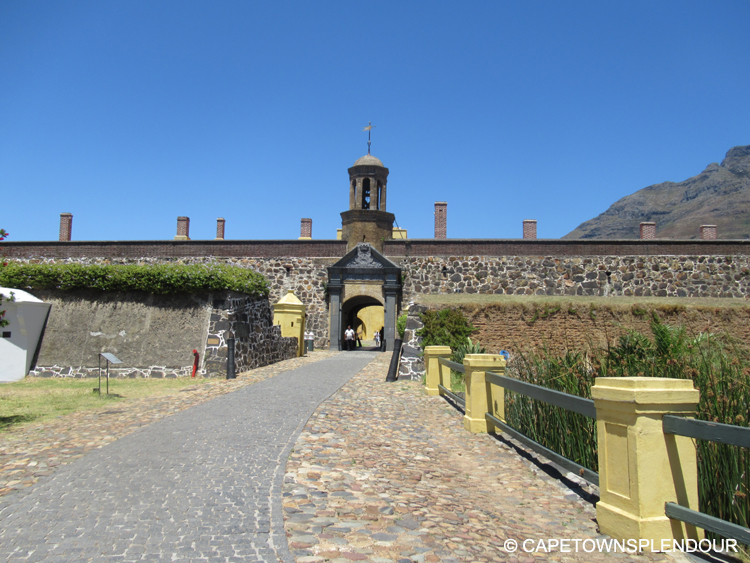
THE CASTLE OF GOOD HOPE
The Castle of Good Hope is located to the east of the Grande Parade. One of the initial significant edifices constructed by the early immigrants. In the early 1600s, Dutch settlers felt obligated to protect themselves from the crew of many English vessels. Slaves were imported from Malaysia for this purpose after the Khoisan people declined to labor for the Europeans. Enhanced global trade and transportation united individuals from diverse backgrounds, creating a melting pot of interwoven historical narratives.
The Castle, constructed between 1666 and 1679, is the oldest extant structure in South Africa, although not being the inaugural fort. It comprises five bastions, each possessing an own narrative, and was coated in yellow to mitigate glare.
YOU MIGHT LIKE:
You might also like GLITZYMAGAZINE to read more about tourist day trips and travel guide to great sightseeing landmarks in the Western Cape.
Click on CAPETOWNSPLENDOUR to learn more about other weekend activities for the whole family.
Click on
ARCHITECTCAPETOWN for more about natural attractions in Franschhoek.
TOWN HALL

THE TOWN HALL
A physically active individual, equipped with a reliable map and suitable footwear, should encounter no difficulties traversing from the Company's Garden to the municipal square, referred to as the Grande Parade, adjacent to the Town Hall. This edifice is significant as it serves as a reminder of colonial past and emancipation. A statue of Nelson Mandela was erected in 2018 and currently resides on the balcony to inspire others to emulate his principles of unity and forgiveness. The edifice was constructed in the early 1900s utilizing limestone sourced from Bath, England. On February 11, 1990, Nelson Mandela delivered his inaugural public address from the balcony of City Hall, after to his release from incarceration. Formerly a civic office building, City Hall today accommodates public events, art exhibitions, and concerts. The annual festival of lights adorns the structure with vibrant illumination.
CAPE DUTCH GABLE IMAGES>
ST GEORGES CATHEDRAL

ST. GEORGES CATHEDRAL
Commonly known as The Cathedral Church of St George the Martyr, St George's Cathedral is an Anglican church that serves as the episcopal seat of the Archbishop of Cape Town, South Africa. In addition to being a congregation of the Diocese of Cape Town, St. George's Cathedral serves as the metropolitan cathedral of the Anglican cathedral in Southern Africa.
The cathedral was designed by Sir Herbert Baker, and the initial foundation stones were laid in 1901. The cathedral was constructed on that site, replacing an incomplete church.
ALSO VISIT:
Press on the link GLITZYMAGAZINE to find out about the menu of top landmarks and sightseeing attractions in Cape Town and Winelands.
Press on CAPETOWNSPLENDOUR for the best things to do in Cape Town with kids and toddlers.
Go to
ARCHITECTCAPETOWN for more on things to do with kids on the weekends in Cape Town.
DELVILLE WOOD MEMORIAL
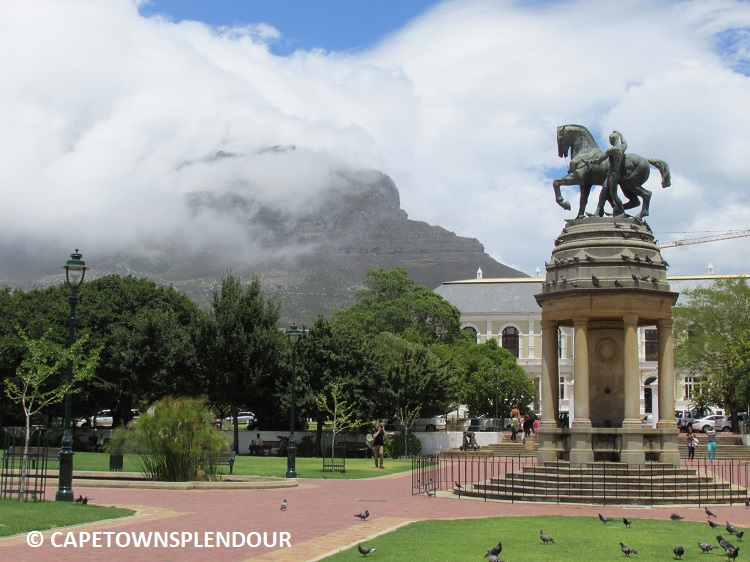
DELVILLE WOOD MEMORIAL
This exquisite monument is situated in the Company's Garden in the center of Cape Town. Upon establishing the Cape Colony as a replenishment station en route to the East, the Dutch East India Company constructed its inaugural fruit and vegetable garden. The Delville Wood memorial, inaugurated in 1930, commemorates the troops who fought in Delville Wood, France, and other World War I battlefields, and is situated within this park. Two male men flanking a horse are depicted resting on eight classical-style columns. Two 245-friendly soldiers perished in this combat. At the center of this beautiful garden lies an elegant tribute to them.
Adjacent to this dynamic monument, rose gardens thrive, overlooked by the National Art Gallery and the South African National Museum in the center of the Book. Numerous locations are located on both sides of these ancient gardens, which are open throughout the summer from 7:00 to 19:00 and in the winter from 7:00 to 18:00. Located on Queen Victoria Street.
CAPE DUTCH ARCHITECTURE CHARACTERISTICS
DINNER AT THE ROUND HOUSE
Following an exhilarating day of visiting the historical center of Cape Town, proceed to Camps Bay and visit another historical treasure to enjoy a well-deserved lunch. Constructed in 1786, it initially served as a lookout for enemy vessels as a guardhouse for the Dutch East India Company. Subsequently, Governor Lord Charles Somerset converted it into a hunting lodge. The building's spherical form, as suggested by its name, is designed to enhance the stunning vistas of Camps Bay and the Twelve Apostles mountain range. The Roundhouse, initially the site of Salsify, a fine-dining establishment, has served as both a theatrical venue and a dining facility.
The Sea Room is a dining area abundant in natural light. Guests may indulge in our hyper-seasonal food while enjoying tranquil vistas of the Atlantic Ocean.
The Roundhouse, Roundhouse Road, Camps Bay.
ALSO VISIT:
Press on the link GLITZYMAGAZINE to find out about the best places to find famous sightseeing attractions when you are in the Cape Winelands.
Go to CAPETOWNSPLENDOUR for all the architecture attractions in Cape Town.
Click on
ARCHITECTCAPETOWN for more about natural attractions in Franschhoek.

THE NEW LIGHTHOUSE AT CAPE POINT
The Harold Cooper lighthouse was constructed in 1919 to supplant the previous structure at Cape Point Peak. It has an exquisite white lantern house elevated on a tall brick pedestal. It is constructed 87 meters above sea level on Diaz Point, far nearer to the shoreline than its predecessor. The light illuminates three times every thirty seconds. It possesses a 63 nautical-mile radius, rendering it visible at double the distance of the previous lighthouse. It is the most luminous beacon on the South African coastline, with a brightness of 10 million candelas. More information at ARCHITECTCAPETOWN on the Cape Dutch houses of Franschhoek.
VISIT THESE RELATED SITES:
Visit GLOSSY-MAGAZINE for plenty stunning tourist attractions in the Winelands region of South Africa. Go to GLITZYMAGAZINE to find out about Cape Dutch houses and gardens - a style endemic to South Africa. You might also enjoy GLITZYMAGAZINE to discover more natural and built attractions in the Cape Winelands.
BACK TO THE ARCHITECTURE HOMEPAGE>
DIAS CROSS
This monument was erected to commemorate the arrival of the Portuguese navigator Bartholomew Dias to the cape in 1488. He was the inaugural European navigator to circumnavigate the southern extremity of Africa. The tower serves as a navigational positioning beacon. The sides are painted black to enhance contrast with the skyline.
The original cross raised by the explorer was constructed of wood, and the Portuguese term for it was "Padros." It is no longer in existence, and has been replaced by the concrete monument.

THE ORIGINAL CROSS OF DIAS
Iziko William Fehr Collection (Castle of Good Hope), Public domain, via Wikimedia Commons
A stunning artwork depicting this event was produced by F. Benda in the 18th century. The oil painting is housed in the Iziko William Fehr Collection at the Castle of Good Hope.
This work is in the public domain in its country of origin and in other jurisdictions where the copyright duration is the author's life plus 100 years or less.
DA GAMA’S CROSS

DA GAMA'S CROSS - MONUMENT
Analogous to the Diaz cross, another monument was established by the Portuguese government to commemorate Vasco Da Gama's expedition to the Cape in 1497. Aligned with the Diaz cross, the two crosses direct vessels towards the Whittle Rock shipping yard in False Bay. The Da Gama monument features a shield embossed on its upper part. The two voyages of the Portuguese navigators significantly predated the entrance of the Dutch inhabitants in the region, as well as its designation as a refreshment station for expeditions to the East. Da Gama was the inaugural navigator to traverse the path from Europe to the East. His expedition occurred from 1497 to 1499, spanning two years in total.
On 20 May 1498, following decades of maritime endeavors to access the Indies, which resulted in the loss of thousands of lives and numerous ships due to shipwrecks and assaults, da Gama arrived in Kozhikode. The Portuguese Empire's economy, once reliant on North and coastal West Africa, benefited from unimpeded access to the Indian spice trade. Initially, the primary spices imported from Southeast Asia were pepper and cinnamon; nevertheless, they were soon accompanied by other commodities, all of which were unfamiliar to Europe. Portugal had a market monopoly on some goods for several decades. It was not until a century later that other European powers could challenge Portugal's monopoly and naval supremacy on the Cape Route.
PRESS ON THE LINKS FOR MORE:
Click on the link GLITZYMAGAZINE for a list of exciting activities for toddlers and older children.
Also visit GLITZYMAGAZINE for stunning photographs of parks, gardens and hiking trails in and around Cape Town.
You might also like GLOSSY-MAGAZINE which focuses on built landmarks that tourists visit when the come to Cape Town.
SIMONSTOWN NAVAL BASE

Simonstown Naval Base
The principal naval facility of the South African Navy is situated in the City of Cape Town Metropolitan Municipality, Western Cape, at Naval facility Simonstown. Fleet Command depends on the base for operational support.
In 1743, the Dutch East India Company established a small dockyard in Simon's Town. In the 1790s, the British Royal Navy (RN) took command of the station, subsequently expanding and modernizing it for the next 150 years. In the 1740s, the Dutch East India Company erected two appealing stone warehouses along the river, commemorating the ancient location of the Yard. Adjacent to this location is the South African Naval Museum, housed in the site's oldest edifice—a mast-house, boathouse, and sail loft—dating to 1815.
This picturesque harbor possesses a profound historical significance; it is essential to see.
PRESS ON THE LINKS FOR MORE:
Click on GLOSSY-MAGAZINE to see top parks and gardens in and around the Mother City.
Go to GLITZYMAGAZINE for an itinerary of the best things for kids to do in the holidays.
Visit GLOSSY-MAGAZINE to see gardens in the homes of Cape Dutch houses that are unique to South Africa.
DAY 3. CAPE TOWN PROPER
CASTLE OF GOOD HOPE

THE CASTLE OF GOOD HOPE
The Castle of Good Hope is located to the east of the Grande Parade. One of the initial significant edifices constructed by the early immigrants. In the early 1600s, Dutch settlers felt obligated to protect themselves from the crew of many English vessels. Slaves were imported from Malaysia for this purpose after the Khoisan people declined to labor for the Europeans. Enhanced global trade and transportation united individuals from diverse backgrounds, creating a melting pot of interwoven historical narratives.
The Castle, constructed between 1666 and 1679, is the oldest extant structure in South Africa, although not being the inaugural fort. It comprises five bastions, each possessing an own narrative, and was coated in yellow to mitigate glare.
YOU MIGHT LIKE:
You might also like GLITZYMAGAZINE to read more about tourist day trips and travel guide to great sightseeing landmarks in the Western Cape.
Click on CAPETOWNSPLENDOUR to learn more about other weekend activities for the whole family.
Click on
ARCHITECTCAPETOWN for more about natural attractions in Franschhoek.
TOWN HALL

THE TOWN HALL
A physically active individual, equipped with a reliable map and suitable footwear, should encounter no difficulties traversing from the Company's Garden to the municipal square, referred to as the Grande Parade, adjacent to the Town Hall. This edifice is significant as it serves as a reminder of colonial past and emancipation. A statue of Nelson Mandela was erected in 2018 and currently resides on the balcony to inspire others to emulate his principles of unity and forgiveness. The edifice was constructed in the early 1900s utilizing limestone sourced from Bath, England. On February 11, 1990, Nelson Mandela delivered his inaugural public address from the balcony of City Hall, after to his release from incarceration. Formerly a civic office building, City Hall today accommodates public events, art exhibitions, and concerts. The annual festival of lights adorns the structure with vibrant illumination.
CAPE DUTCH GABLE IMAGES>
ST GEORGES CATHEDRAL

ST. GEORGES CATHEDRAL
Commonly known as The Cathedral Church of St George the Martyr, St George's Cathedral is an Anglican church that serves as the episcopal seat of the Archbishop of Cape Town, South Africa. In addition to being a congregation of the Diocese of Cape Town, St. George's Cathedral serves as the metropolitan cathedral of the Anglican cathedral in Southern Africa.
The cathedral was designed by Sir Herbert Baker, and the initial foundation stones were laid in 1901. The cathedral was constructed on that site, replacing an incomplete church.
ALSO VISIT:
Press on the link GLITZYMAGAZINE to find out about the menu of top landmarks and sightseeing attractions in Cape Town and Winelands.
Press on CAPETOWNSPLENDOUR for the best things to do in Cape Town with kids and toddlers.
Go to
ARCHITECTCAPETOWN for more on things to do with kids on the weekends in Cape Town.
DELVILLE WOOD MEMORIAL

DELVILLE WOOD MEMORIAL
This exquisite monument is situated in the Company's Garden in the center of Cape Town. Upon establishing the Cape Colony as a replenishment station en route to the East, the Dutch East India Company constructed its inaugural fruit and vegetable garden. The Delville Wood memorial, inaugurated in 1930, commemorates the troops who fought in Delville Wood, France, and other World War I battlefields, and is situated within this park. Two male men flanking a horse are depicted resting on eight classical-style columns. Two 245-friendly soldiers perished in this combat. At the center of this beautiful garden lies an elegant tribute to them.
Adjacent to this dynamic monument, rose gardens thrive, overlooked by the National Art Gallery and the South African National Museum in the center of the Book. Numerous locations are located on both sides of these ancient gardens, which are open throughout the summer from 7:00 to 19:00 and in the winter from 7:00 to 18:00. Located on Queen Victoria Street.
CAPE DUTCH ARCHITECTURE CHARACTERISTICS
DINNER AT THE ROUND HOUSE
Following an exhilarating day of visiting the historical center of Cape Town, proceed to Camps Bay and visit another historical treasure to enjoy a well-deserved lunch. Constructed in 1786, it initially served as a lookout for enemy vessels as a guardhouse for the Dutch East India Company. Subsequently, Governor Lord Charles Somerset converted it into a hunting lodge. The building's spherical form, as suggested by its name, is designed to enhance the stunning vistas of Camps Bay and the Twelve Apostles mountain range. The Roundhouse, initially the site of Salsify, a fine-dining establishment, has served as both a theatrical venue and a dining facility.
The Sea Room is a dining area abundant in natural light. Guests may indulge in our hyper-seasonal food while enjoying tranquil vistas of the Atlantic Ocean.
The Roundhouse, Roundhouse Road, Camps Bay.
ALSO VISIT:
Press on the link GLITZYMAGAZINE to find out about the best places to find famous sightseeing attractions when you are in the Cape Winelands.
Go to CAPETOWNSPLENDOUR for all the architecture attractions in Cape Town.
Click on
ARCHITECTCAPETOWN for more about natural attractions in Franschhoek.

DA GAMA'S CROSS - MONUMENT
Analogous to the Diaz cross, another monument was established by the Portuguese government to commemorate Vasco Da Gama's expedition to the Cape in 1497. Aligned with the Diaz cross, the two crosses direct vessels towards the Whittle Rock shipping yard in False Bay. The Da Gama monument features a shield embossed on its upper part. The two voyages of the Portuguese navigators significantly predated the entrance of the Dutch inhabitants in the region, as well as its designation as a refreshment station for expeditions to the East. Da Gama was the inaugural navigator to traverse the path from Europe to the East. His expedition occurred from 1497 to 1499, spanning two years in total.
On 20 May 1498, following decades of maritime endeavors to access the Indies, which resulted in the loss of thousands of lives and numerous ships due to shipwrecks and assaults, da Gama arrived in Kozhikode. The Portuguese Empire's economy, once reliant on North and coastal West Africa, benefited from unimpeded access to the Indian spice trade. Initially, the primary spices imported from Southeast Asia were pepper and cinnamon; nevertheless, they were soon accompanied by other commodities, all of which were unfamiliar to Europe. Portugal had a market monopoly on some goods for several decades. It was not until a century later that other European powers could challenge Portugal's monopoly and naval supremacy on the Cape Route.
PRESS ON THE LINKS FOR MORE:
Click on the link GLITZYMAGAZINE for a list of exciting activities for toddlers and older children. Also visit GLITZYMAGAZINE for stunning photographs of parks, gardens and hiking trails in and around Cape Town. You might also like GLOSSY-MAGAZINE which focuses on built landmarks that tourists visit when the come to Cape Town.
SIMONSTOWN NAVAL BASE

Simonstown Naval Base
The principal naval facility of the South African Navy is situated in the City of Cape Town Metropolitan Municipality, Western Cape, at Naval facility Simonstown. Fleet Command depends on the base for operational support.
In 1743, the Dutch East India Company established a small dockyard in Simon's Town. In the 1790s, the British Royal Navy (RN) took command of the station, subsequently expanding and modernizing it for the next 150 years. In the 1740s, the Dutch East India Company erected two appealing stone warehouses along the river, commemorating the ancient location of the Yard. Adjacent to this location is the South African Naval Museum, housed in the site's oldest edifice—a mast-house, boathouse, and sail loft—dating to 1815.
This picturesque harbor possesses a profound historical significance; it is essential to see.
PRESS ON THE LINKS FOR MORE:
Click on GLOSSY-MAGAZINE to see top parks and gardens in and around the Mother City.
Go to GLITZYMAGAZINE for an itinerary of the best things for kids to do in the holidays.
Visit GLOSSY-MAGAZINE to see gardens in the homes of Cape Dutch houses that are unique to South Africa.
DAY 3. CAPE TOWN PROPER
CASTLE OF GOOD HOPE

THE CASTLE OF GOOD HOPE
The Castle of Good Hope is located to the east of the Grande Parade. One of the initial significant edifices constructed by the early immigrants. In the early 1600s, Dutch settlers felt obligated to protect themselves from the crew of many English vessels. Slaves were imported from Malaysia for this purpose after the Khoisan people declined to labor for the Europeans. Enhanced global trade and transportation united individuals from diverse backgrounds, creating a melting pot of interwoven historical narratives.
The Castle, constructed between 1666 and 1679, is the oldest extant structure in South Africa, although not being the inaugural fort. It comprises five bastions, each possessing an own narrative, and was coated in yellow to mitigate glare.
YOU MIGHT LIKE:
You might also like GLITZYMAGAZINE to read more about tourist day trips and travel guide to great sightseeing landmarks in the Western Cape.
Click on CAPETOWNSPLENDOUR to learn more about other weekend activities for the whole family.
Click on
ARCHITECTCAPETOWN for more about natural attractions in Franschhoek.
TOWN HALL

THE TOWN HALL
A physically active individual, equipped with a reliable map and suitable footwear, should encounter no difficulties traversing from the Company's Garden to the municipal square, referred to as the Grande Parade, adjacent to the Town Hall. This edifice is significant as it serves as a reminder of colonial past and emancipation. A statue of Nelson Mandela was erected in 2018 and currently resides on the balcony to inspire others to emulate his principles of unity and forgiveness. The edifice was constructed in the early 1900s utilizing limestone sourced from Bath, England. On February 11, 1990, Nelson Mandela delivered his inaugural public address from the balcony of City Hall, after to his release from incarceration. Formerly a civic office building, City Hall today accommodates public events, art exhibitions, and concerts. The annual festival of lights adorns the structure with vibrant illumination.
CAPE DUTCH GABLE IMAGES>
ST GEORGES CATHEDRAL

ST. GEORGES CATHEDRAL
Commonly known as The Cathedral Church of St George the Martyr, St George's Cathedral is an Anglican church that serves as the episcopal seat of the Archbishop of Cape Town, South Africa. In addition to being a congregation of the Diocese of Cape Town, St. George's Cathedral serves as the metropolitan cathedral of the Anglican cathedral in Southern Africa.
The cathedral was designed by Sir Herbert Baker, and the initial foundation stones were laid in 1901. The cathedral was constructed on that site, replacing an incomplete church.
ALSO VISIT:
Press on the link GLITZYMAGAZINE to find out about the menu of top landmarks and sightseeing attractions in Cape Town and Winelands.
Press on CAPETOWNSPLENDOUR for the best things to do in Cape Town with kids and toddlers.
Go to
ARCHITECTCAPETOWN for more on things to do with kids on the weekends in Cape Town.
DELVILLE WOOD MEMORIAL

DELVILLE WOOD MEMORIAL
This exquisite monument is situated in the Company's Garden in the center of Cape Town. Upon establishing the Cape Colony as a replenishment station en route to the East, the Dutch East India Company constructed its inaugural fruit and vegetable garden. The Delville Wood memorial, inaugurated in 1930, commemorates the troops who fought in Delville Wood, France, and other World War I battlefields, and is situated within this park. Two male men flanking a horse are depicted resting on eight classical-style columns. Two 245-friendly soldiers perished in this combat. At the center of this beautiful garden lies an elegant tribute to them.
Adjacent to this dynamic monument, rose gardens thrive, overlooked by the National Art Gallery and the South African National Museum in the center of the Book. Numerous locations are located on both sides of these ancient gardens, which are open throughout the summer from 7:00 to 19:00 and in the winter from 7:00 to 18:00. Located on Queen Victoria Street.
CAPE DUTCH ARCHITECTURE CHARACTERISTICS
DINNER AT THE ROUND HOUSE
Following an exhilarating day of visiting the historical center of Cape Town, proceed to Camps Bay and visit another historical treasure to enjoy a well-deserved lunch. Constructed in 1786, it initially served as a lookout for enemy vessels as a guardhouse for the Dutch East India Company. Subsequently, Governor Lord Charles Somerset converted it into a hunting lodge. The building's spherical form, as suggested by its name, is designed to enhance the stunning vistas of Camps Bay and the Twelve Apostles mountain range. The Roundhouse, initially the site of Salsify, a fine-dining establishment, has served as both a theatrical venue and a dining facility.
The Sea Room is a dining area abundant in natural light. Guests may indulge in our hyper-seasonal food while enjoying tranquil vistas of the Atlantic Ocean.
The Roundhouse, Roundhouse Road, Camps Bay.
ALSO VISIT:
Press on the link GLITZYMAGAZINE to find out about the best places to find famous sightseeing attractions when you are in the Cape Winelands.
Go to CAPETOWNSPLENDOUR for all the architecture attractions in Cape Town.
Click on
ARCHITECTCAPETOWN for more about natural attractions in Franschhoek.

ST. GEORGES CATHEDRAL
SOUTH TABLE MOUNTAIN
RHODES MEMORIAL

THE RHODES MEMORIAL
The monument is accessible via the same routes that lead to the University of Cape Town. It overlooks the botanical gardens. It is the tallest and most significant edifice in the mountains, adhering to Table Mountain. It was constructed to commemorate Cecil John Rhodes. Sir Herbert Baker, a renowned architect, created several edifices for Rhodes.
Sir Herbert Baker constructed several renowned edifices, including the Union Buildings in Pretoria, St. Andrew's College in Grahamstown, St. John's College in Johannesburg, Wynberg Boys' High School, and Groote Schuur in Cape Town. He is a significant historical figure. He was responsible for the design of the Rhodes Cottage at Boschendal Farm. Although he was born in England, he constructed public edifices in India.

THE VIEW FROM THE RHODES MEMORIAL
Baker recognized the project's potential to transform it into a permanent architectural masterpiece. The modest roof span and colonnade feature statues of lions, a horse, and a rider, creating an aesthetically pleasing architectural arrangement. The series of steps enhances the gradient and improves the vistas.
From 1890 to 1896, Rhodes served as the leader of the Cape administration. He is a significant figure in South African history due to his establishment of the mining firm De Beers, which profoundly impacted the economy. Rhodes was born in 1853 and passed away in 1902. A monument for Rhodes existed for ten years following his death.

SCULPTURE AT THE RHODES MEMORIAL
The memorial holds historical significance, and the vistas of Groote Schuur, the Hottentot's Holland Mountains, and the Cape Flats render it a renowned destination for tourists. Furthermore, it is rare to observe both the Atlantic and Indian Oceans from a single location.
You may also enjoy... TOP-ARCHITECTS for more about architecture sightseeing itineraries in Cape Town.
YOU MAY ALSO ENJOY:
Press on the link GLITZYMAGAZINE to find the menu of architectural attractions in Cape Town. See also CAPETOWNSPLENDOUR for all the best hiking trails in Cape Town. You might also like ARCHITECTCAPETOWN with modern and traditional Cape Dutch homes.
BUITENVERWACHTING
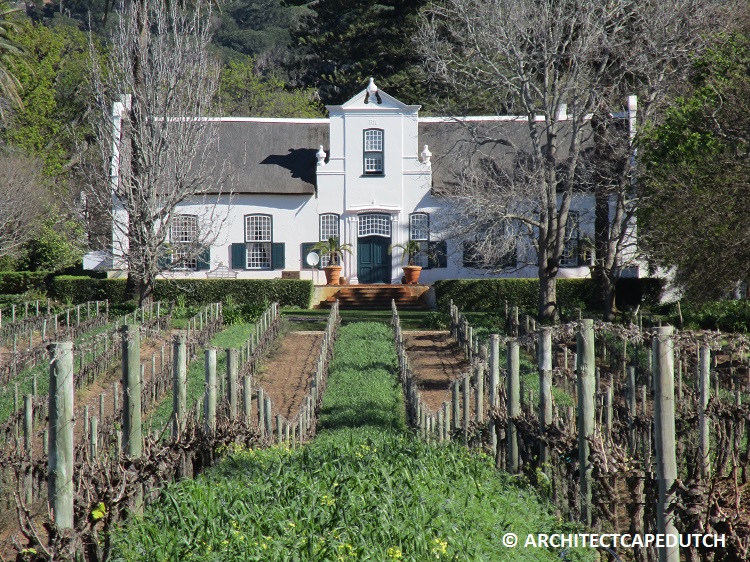
BUITENVERWACHTING WINE FARM
Buitenverwachting Wine Farm is located on 37 Klein Constantia Road, just opposite to Groot Constantia. It was initially a component of the Constantia Estate, established by Simon van der Stel, the inaugural Governor of the replenishing outpost created by the Dutch in the 1600s, which ultimately resulted in the establishment of the Cape colony.

THE IDYLLIC GARDENS AND MOUNTAIN BACKDROP
In 1773, the land was sold as a 200-morgen subdivision to Cornelis Brink. Following multiple transfers of ownership, the farm began to prosper in 1825 under Ryk Arnoldus Cloete, sibling of the renowned Hendrik Cloete of Constantia. He cultivated 90,000 vines, thereby establishing the farm as a prominent wine producer. Press on... ARCHITECTCAPETOWN
HISTORY OF CAPE DUTCH ARCHITECTURE
The Cape Dutch manor house exemplifies the Peninsula style, characterized by its prominent mid-gable section. The house, featuring gently arched windows and an urn in the split-gable, stands prominently in its stunning environment. The shifting seasons render the vineyards either bare or verdant, providing excellent photographic opportunity year-round. This concealed treasure is essential for any Cape Town holiday plan.
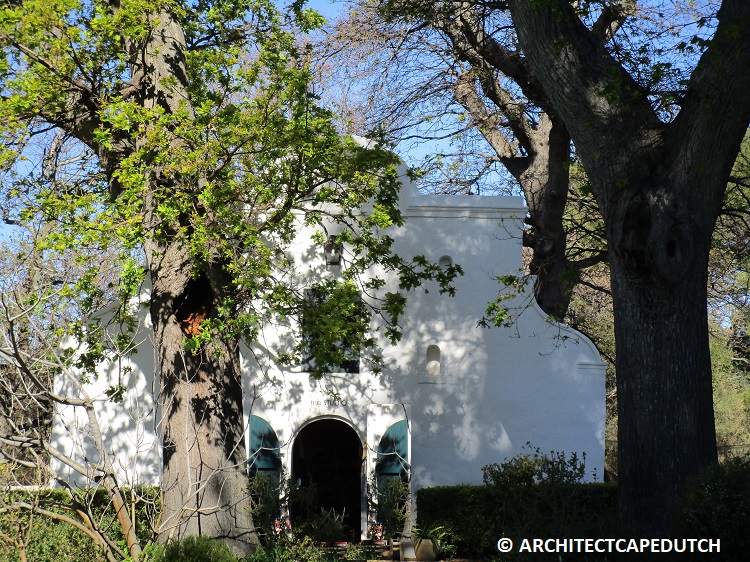
THE SHOP AT BUITENVERWACHTING
The coffee shop, wine tasting center, and restaurant encircle a verdant courtyard. The farm consistently astonishes guests, really embodying its moniker, which translates to "Beyond expectations."
OF INTEREST:
Press on the link GLITZYMAGAZINE to find out more on the best residential and lifestyle estates in the Cape. You might also like CAPETOWNSPLENDOUR to learn about the greatest landmarks in the region. You might also be interested in clicking on ARCHITECTCAPETOWN for great sightseeing landmarks in the Western Cape.

PAARL LANGUAGE MONUMENT
PAARL LANGUAGE MONUMENT
Constructed in 1975, this notable monument was erected to honor the designation of Afrikaans as South Africa's national language. The elevated spires represent the various linguistic components that amalgamated to form Afrikaans. Located on a hillside near Paarl Rock, the concrete structure provides stunning vistas of the surrounding Winelands.
See for award for house on Polo Field in french style designed by Cape Town architect Beverley Hui. Also see... TOP-ARCHITECTS for more on Travel in Cape Town, South Africa.
BEST PARKS AND GARDENS OF CAPE TOWN
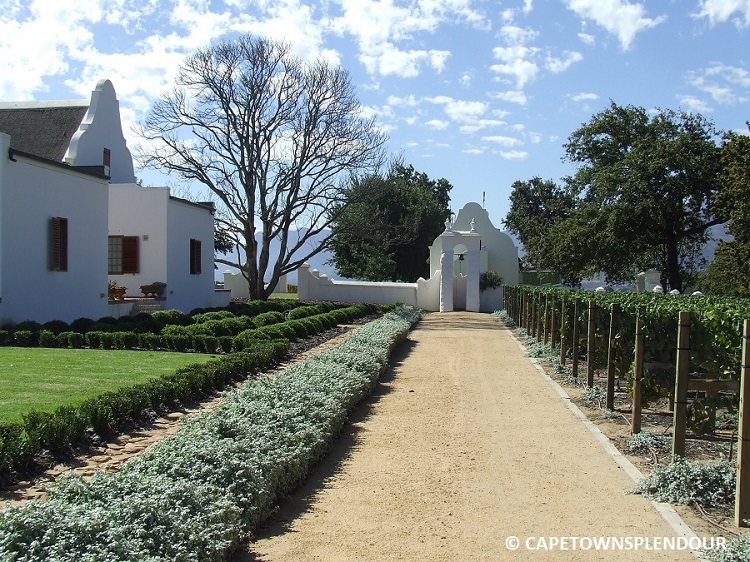
BABYLONSTOREN ORGANIC GARDENS
BABYLONSTOREN
Babylonstoren Organic Gardens, located in Franschhoek, has developed around a historic Cape Dutch manor house. The facility serves as a significant educational and horticultural resource in the Western Cape, owing to its different ecosystems and plant species. The stunning vistas from Simonberg Mountain produce awe-inspiring natural landscapes. A café and bakery offer exceptional cuisine crafted from locally sourced ingredients. A little petting zoo, alongside a fish tank and water fountain, engages children. This is a comprehensive event that is essential to attend, with activities for all attendees. You may also enjoy... TOP-ARCHITECTS for more about architecture sightseeing itineraries in Cape Town. You might also be interested in the site PLOTSFORSALECAPETOWN if you like travel and sightseeing in Cape Town and Winelands.
Click on ArchitectCapeTown for more stellenbosch residential architecture.
TOP ARCHITECTS OF CAPE TOWN>
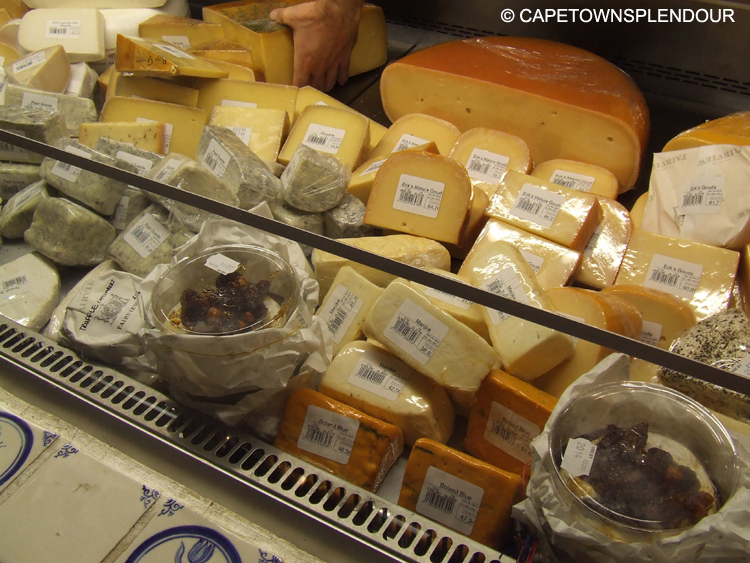
FAIRVIEW CHEESES
FAIRVIEW CHEESE AND WINE
The history of Fairview cheeses commenced thirty years ago with Cyril Back's acquisition of his inaugural Saanen dairy goats. This event signified the commencement of Fairview's ascent to being one of the foremost artisanal cheese manufacturers in South Africa.
Currently, Fairview offers a range of award-winning artisanal cheeses recognized both nationally and globally. The cheeses comprise cream cheese, feta, blue mold, and white mold variants. A leading Jersey milk dairy company supplies most of the cheesery's cow's milk. Approximately one thousand goats constitute the resident herd that provides milk for the development of Saanen goats. A thorough audit was conducted on the factory, confirming its complete adherence to international hygiene and safety standards. The Fairview cheese range has received both Halaal and Kosher certifications.
Click on TOP-ARCHITECTS to see other examples of modern home design.
DISCOVER MORE:
SOMERSET WEST CONTEMPORARY ARCHITECTS>

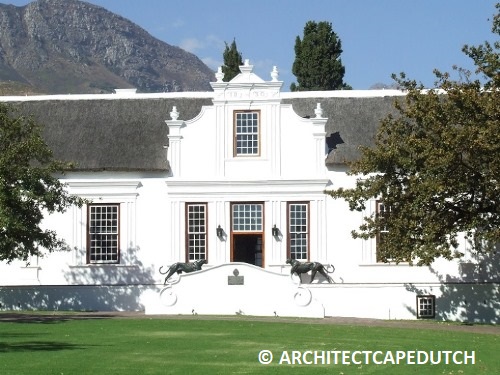 MANOR HOUSE AT LANZERAC
MANOR HOUSE AT LANZERAC
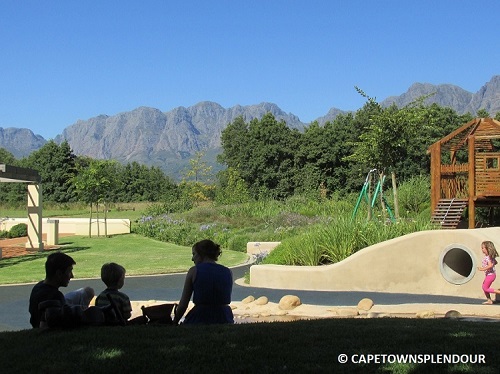 GARDENS AT VERGELEGEN
GARDENS AT VERGELEGEN
